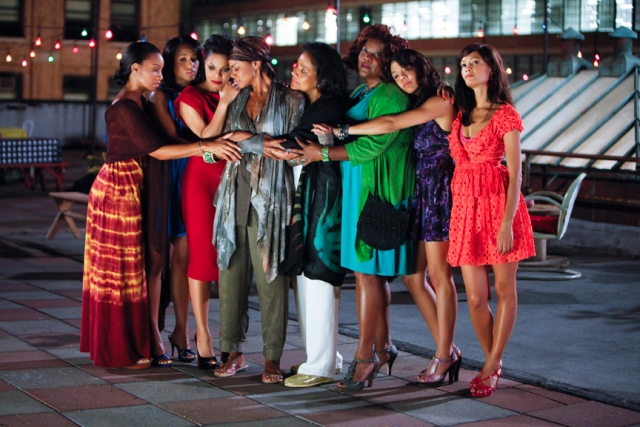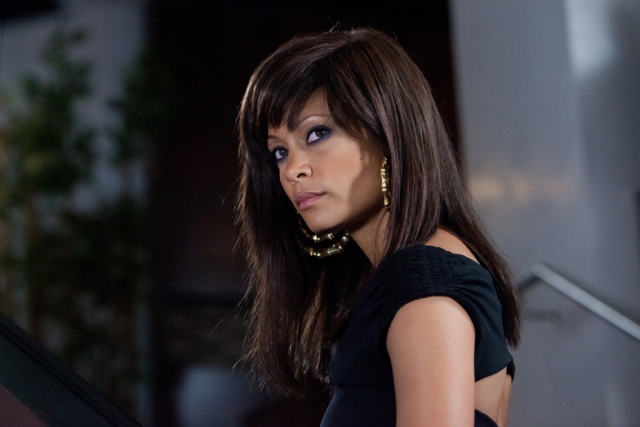 Rating: 2.5/5.0 |
CHICAGO– Ntozake Shange’s choreopoem “For Colored Girls Who Have Considered Suicide When the Rainbow is Enuf” was a landmark event in 1974, giving voice to a segment of society rarely seen on the stage. It took 34 years for a filmmaker to tackle this remarkable work in film form and Tyler Perry’s “For Colored Girls” retains some of the inherent power of it source and features some strong performances in the process but never finds the narrative cohesion needed to translate it to modern movie audiences.
The stage version of “For Colored Girls” consisted of nothing more than monologues or poems – stories, life lessons, and confessions of a group of women finding their voices through expression. Perry takes several of those expressions and works them into a narrative, adding other characters, relationships, and connective tissue in an effort to make a piece of poetry into a piece of prose. The biggest problem is that it’s not that easy. Poetry works for different reasons than prose. Theater works for different reasons than film. And Perry too often gets caught in the gray area in between the multiple forms that he’s trying to weave into one fabric. It’s too easy to see the seams.

For Colored Girls
Photo credit: Lionsgate
More damagingly, the new structure of “For Colored Girls” falls victim to its own structure because Perry is forced to insert another emotionally draining scene nearly every five to ten minutes. Hearing different voices express the pain of their lives has a much different impact on an audience than trying to turn it all into one interconnected story. “For Colored Girls” becomes numbing in its melodrama as we know each moment of pain will be followed by another one a few minutes later. And it lessens the connecting scenes when it feels like they are merely pushing us to another breakdown. There are more shots of tears and snot in “For Colored Girls” than any other movie in a very long time.
“For Colored Girls” basically tells nine interconnected stories – that of Crystal (Kimberly Elise), Jo (Janet Jackson), Juanita (Loretta Devine), Tangie (Thandie Newton), Yasmine (Anika Noni Rose), Kelly (Kerry Washington), Nyla (Tessa Thompson), Gilda (Phylicia Rashad), and Alice (Whoopi Goldberg). All of the characters are related either directly or through minimal degrees of separation. For example, Alice is the mother of Nyla and Tangie, who lives across the hall from Crystal, who works for Jo, and so on. Every character in “For Colored Girls” comes with significant, life-changing drama including abuse, rape, murder, addiction, promiscuity, unplanned pregnancy, and more. There’s enough melodrama in “For Colored Girls” for an entire season of most soap operas.
And that’s part of the problem with “For Colored Girls.” It starts to become numbing in its bleak representation of urban pain. Does life sometimes turn out for women like it does in “For Colored Girls”? Tragically and undeniably yes. But the stories of these women are lessened by having them all pounded home with such force scene after scene after scene. We don’t get the spectrum of life when we are only presented with the melodrama of it.

For Colored Girls
Photo credit: Lionsgate
There are a few actresses in “For Colored Girls” who find the humanity beneath the manipulation. Anika Noni Rose and Kimberly Elise particularly shine with the two best performances in Perry’s entire filmography. Despite his often being critically-ridiculed, the man’s number one strength as a filmmaker has been his ability to draw quality performances from talented actresses like Taraji P. Henson or Angela Bassett. His stage background has made him a quality director in terms of performance. His work with Rose, Elise, and, to a lesser extent, Thandie Newton and Phylicia Rashad, should be praised and nearly saves the film.
Sadly, each quality turn in “For Colored Girls” is balanced by one that doesn’t ring true. The structure of the film never allows what works about it to gain traction. Elise or Rose will find a genuine moment only to be followed by a scene in which Jackson, Goldberg, Washington or Devine ring completely false. The actresses are not completely to blame — they are often given material no one could make work. And the men, including Omari Hardwick, Michael Ealy, and Hill Harper, are purely plot devices. They’re there to make the monologues feel less theatrical.
Part-theatre, part-poetry, part-melodrama – “For Colored Girls” is a movie with a lot of parts that never forms a cohesive whole. Elise and Rose’s contributions are notable enough to nearly recommend the film but they can’t save Perry’s work overall. The question of whether or not another filmmaker could have done more with Shange’s choreopoem will be debated for years to come. Perhaps it’s something that never could have worked off the stage, especially as times have changed in significant ways since it was first staged. We’ll never know. But we will know that this version of “For Colored Girls” doesn’t do the original justice.
 | By BRIANTALLERICO |























